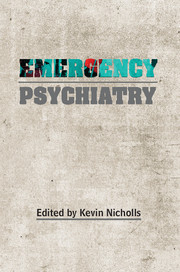Book contents
- Frontmatter
- Contents
- List of contributors
- Acknowledgements
- Preface
- 1 Assessment of suicide risk
- 2 Violence and aggression
- 3 Substance misuse emergencies
- 4 Alcohol and psychiatric emergencies
- 5 Acute psychosis
- 6 Acute side-effects of psychotropic medication
- 7 Emergencies in child and adolescent psychiatry
- 8 The psychiatric intensive care unit
- 9 Safeguarding
- 10 Emergency electroconvulsive therapy
- 11 Life-threatening medical emergencies in a mental health unit
- 12 Emergencies in intellectual disability psychiatry
- 13 Emergencies in older persons’ psychiatry
- 14 Perinatal psychiatric emergencies
- 15 Civilian and military psychological trauma
- 16 Emergencies in liaison psychiatry
- 17 Psychiatric emergencies in deaf people
- 18 Mental health law
- 19 Self-poisoning: aspects of assessment and initial care
- Index
5 - Acute psychosis
Published online by Cambridge University Press: 01 January 2018
- Frontmatter
- Contents
- List of contributors
- Acknowledgements
- Preface
- 1 Assessment of suicide risk
- 2 Violence and aggression
- 3 Substance misuse emergencies
- 4 Alcohol and psychiatric emergencies
- 5 Acute psychosis
- 6 Acute side-effects of psychotropic medication
- 7 Emergencies in child and adolescent psychiatry
- 8 The psychiatric intensive care unit
- 9 Safeguarding
- 10 Emergency electroconvulsive therapy
- 11 Life-threatening medical emergencies in a mental health unit
- 12 Emergencies in intellectual disability psychiatry
- 13 Emergencies in older persons’ psychiatry
- 14 Perinatal psychiatric emergencies
- 15 Civilian and military psychological trauma
- 16 Emergencies in liaison psychiatry
- 17 Psychiatric emergencies in deaf people
- 18 Mental health law
- 19 Self-poisoning: aspects of assessment and initial care
- Index
Summary
In this chapter, we will provide an overview of the assessment and shortterm management of people of presenting with acute psychotic symptoms. Our aim is to focus on practicalities and to highlight real-world issues. In reality, it is not always possible to deliver what is considered best practice because of time and resource constraints. Decisions often have to be made on little information and clinicians need to be prepared to frequently review their management in the light of new information as the clinical picture unfolds. Cultural issues need to be borne in mind to avoid labelling culturally appropriate distress as mental illness.
Although it is crucial to share information among professionals (for example, when there are safeguarding concerns regarding children), confidentiality principles still apply. Thought will also need to be given to the use of the Mental Health Act 2007 or Mental Capacity Act 2005 in many cases.
This chapter will focus on urgent presentations, but it should be remembered that patients who have psychotic symptoms do not always present in crisis. With better psychoeducation, the routine use of relapse signature recognition, better access and other service developments it is not uncommon for patients to identify deterioration in their own mental health and seek help before a crisis response is needed.
Presentation
Patients suffering psychotic disorders often present in a distressed and agitated state, especially in a first episode. The majority of assessments take place in accident and emergency departments, custody suites, general hospital wards, the patient's residence and section 136 suites. Sometimes these presentations are voluntary – when the patient presents to find relief for his or her distressing experiences, or after being coaxed by their friends and family to seek help. Some of these voluntary presentations might be the result of delusional systems. For example, the subject might call the police to complain about a conspiracy or present to their general practitioner (GP) requesting a surgical referral so that an implanted microchip that is controlling their mind can be removed.
- Type
- Chapter
- Information
- Emergency Psychiatry , pp. 69 - 88Publisher: Royal College of PsychiatristsPrint publication year: 2015

